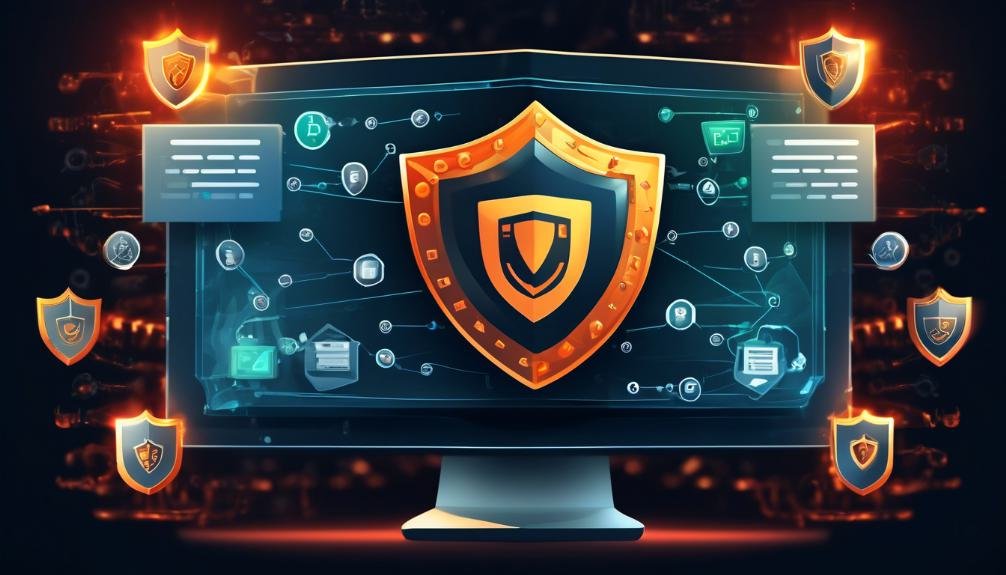So, you think your website is safe from hackers, huh? Think again. In today’s digital landscape, no website is immune to the threat of cyber attacks.
But fear not, there are concrete steps you can take to fortify your website security and fend off potential intruders. From basic security measures to advanced practices, and from protection for ecommerce sites to disaster recovery planning, there’s a wealth of strategies at your disposal.
By implementing these measures, you can safeguard your website and keep it out of harm’s way.
Basic Security Measures

Make sure your website is safe from hackers by putting in place simple security measures.
Start by setting up a good firewall to block bad requests and known hacker IPs.
Have a strict password policy and encourage the use of a password manager to keep your WordPress login details secure.
Also, get an SSL certificate and turn on HTTPS to encrypt web communication and protect sensitive data.
Regularly check and remove unnecessary admin users to lower security risks.
Use an activity log to keep an eye on any unauthorized actions on the website, which can help protect your web hosting and overall website security.
Following these security measures can help safeguard your website from hackers and keep your data safe.
Advanced Security Practices

You should think about using a complete web application firewall (WAF) for real-time threat detection and prevention to boost your website’s advanced security practices.
Regularly check for security issues and weaknesses with security audits and vulnerability assessments.
Use a content delivery network (CDN) to distribute website content and lessen DDoS attacks.
Teach website users and administrators about common security threats and best practices.
Set up a whitelist of allowed file extensions for secure file uploads.
Also, make sure all software, including security plugins and web applications, is up to date with the latest security patches.
Secure hosting, SSL certificates, and backup plugins are also important security measures to protect your website from potential security vulnerabilities.
Protection for Ecommerce Sites

When it comes to protecting your ecommerce site, there are several key points to consider.
First, ensure secure payment processing by implementing a third-party fraud prevention service and setting transaction limits to repel fraud attacks.
Regular security updates, strong user authentication, and understanding PCI-DSS requirements and best practices are also crucial for safeguarding your ecommerce site against potential threats.
Secure Payment Processing
To keep your ecommerce site’s payment processing secure, you need to take several important steps.
First, use trusted payment platforms like PayPal, Stripe, or Square to handle customer transactions safely. These platforms have strong security measures in place to protect sensitive payment information.
Next, implement tokenization to replace sensitive payment data with a unique identifier. This reduces the risk of exposing customer information and adds an extra layer of security.
Regularly check your payment processing systems for security issues and promptly fix any problems that arise. This proactive approach will help ensure that your systems are always up to date and protected against potential vulnerabilities.
Follow the Payment Card Industry Data Security Standard (PCI DSS) requirements to handle cardholder data securely during transactions. Compliance with these standards is crucial for safeguarding customer payment information.
Educate your staff and customers about the best practices for keeping payments secure. This includes advising them to avoid using public Wi-Fi for transactions and teaching them how to spot phishing attempts.
Additionally, take steps to protect your website from potential threats like SQL injection. Use strong passwords, implement security plugins, and ensure that your site has SSL and HTTPS encryption. Regularly perform malware scans to detect and eliminate any potential malware that could compromise your system.
Regular Security Updates
It’s important to keep your ecommerce site secure by regularly updating its security.
Make sure to keep your website platform and software up-to-date to protect against known vulnerabilities and security flaws.
Set up automatic security updates for your ecommerce site to stay ahead of potential threats.
Strong User Authentication
To keep your customer accounts and personal information safe on ecommerce sites, it’s important to use strong methods for verifying users. Here are some tips for securing your ecommerce platform:
- Use multi-factor authentication to make it harder for unauthorized people to log in or make transactions.
- Make sure that passwords have to be a certain length and include different types of characters, and make people change their passwords regularly.
- Consider using biometric verification, like fingerprints or facial recognition, to make sure that only authorized users can access your ecommerce website.
By using these methods, you can make it a lot harder for people to get into user accounts or see sensitive information, which makes your website a safer place for people to shop online.
For even more security, think about using website security tools, keeping your software up to date, and limiting the number of times people can try to log in to make it even harder for unauthorized users to get into your ecommerce site.
Disaster Recovery Planning

When it comes to protecting your website from cyber attacks, having a solid disaster recovery plan is key. This plan will help you minimize downtime and data loss if your website is ever compromised.
You need to have a plan in place to get your website back up and running if it’s hit by malware or breaches. Regularly backing up your website’s data and storing it securely is really important. Keeping your software up to date will also help prevent vulnerabilities.
Make sure to test your disaster recovery plan regularly to make sure it works well in real-life situations. It’s also important to have a strong incident response strategy and to keep updating and improving your plan to stay ahead of security threats and technology changes.
Essential Security Tools

When you need to protect your website from cyber threats, it’s important to have the right security tools. Here are some essential steps to keep hackers at bay:
- Use security plugins like iThemes Security, Bulletproof Security, Sucuri, Wordfence, and fail2Ban.
- Get an SSL certificate and use HTTPS to secure your website’s communication.
- Keep your website platform and software up to date to fix any security issues.
Common Website Security Mistakes

You must be aware of common website security mistakes that can make your website vulnerable to attacks.
Security misconfigurations and weak passwords are two of the most prevalent issues that can compromise your website’s security.
Security Misconfigurations
To keep your website safe from mistakes that can make it less secure, you should regularly check and update file permissions.
Here are three important steps to make your website stronger against these kinds of mistakes:
- Use a Content Security Policy (CSP) to protect against common mistakes and attacks like XSS.
- Set up secure permissions for your files and folders to stop unauthorized access and security mistakes.
- Make error messages simpler without losing their usefulness to avoid showing security mistakes.
Weak Passwords
Your WordPress website is at risk when users have weak passwords. This makes it easy for unauthorized people to access your site and potentially cause breaches. To keep your website safe, ask users to make strong and unique passwords.
You can also use a password manager to create and store strong passwords securely. Set password rules for length, complexity, and regular updates to reduce the risk of unauthorized access. Teach users about the importance of strong passwords in protecting sensitive information like credit card details.
You can also add an extra layer of security by using multi-factor authentication for user logins, which lowers the chances of a hacked website.
Importance of Website Security

Website security is really important. You need to use security plugins to keep your website safe from bad things.
You should do three things to protect your website and the people who use it:
- Use HTTPS and SSL certificates to make sure that the information on your website is safe and to make your visitors trust your website.
- Keep your website’s software and platform up to date to stop bad people from taking advantage of any weaknesses.
- Get automatic backups to keep your website’s information safe and to stop it from getting lost if something bad happens.
Conclusion
To wrap it up, there are several steps you can take to enhance your website’s security against hackers:
- Using security plugins
- Ensuring your website has HTTPS
- Regularly updating your software
- Using strong passwords
- Implementing automatic backups
By following these measures, you can strengthen your website’s defense and minimize the risk of cyber attacks. It is essential to prioritize the safety of your users’ information to maintain their trust in your site. With these precautions in place, you can rest assured that your website will remain secure and protected.




